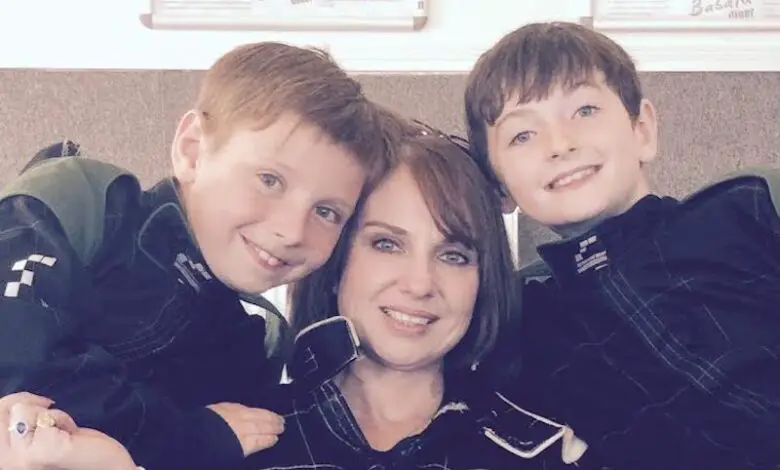
My experience of being a disabled parent with ethlers-danlos syndrome
Being a parent can be difficult for any person but being a parent with a disability can bring additional challenges. Disability consultant, Emma Shepherd, who has two teenage boys, shares her experiences, funny stories and advice on being a disabled parent.
I rarely have considered what it is like being a disabled parent before, I am just a parent – whether I am any good at it, you would have to ask my children. I have never known any different and nor have my boys.
The boys and I have gone through our ups and downs, as any family, but overall, they are good lads – and I could not send them back anyway, as I have lost the receipt.
By writing this article, I am going to give it a bit of a think over. This is my personal story, so it will only be how my disability affects me personally as, us ‘zebras’ are all different. (zebras are the ‘mascot’ of ethlers-danlos syndrome (EDS) and we affectionally call ourselves zebras).
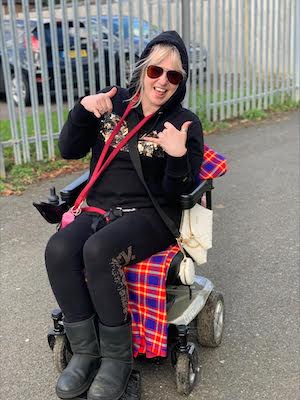
I have ethlers-danlos syndrome, and for me, it seems to be getting progressively worse. In fact, it went completely haywire when I was pregnant, as the hormones that make you more flexible, for helping what feels like squeezing a melon through a straw, made my joints really loose.
It was a little disconcerting that all my joints were held together with tape and braces (or, as people of a certain age would remember, my joints were held together with ‘sticky back plastic and straws’).
About my boys
I have two wonderful boys, one called Morgan who is 17, and knows everything about everything (as you do at that age) and another called Kirry who is just 14. He is actually called Kieran, but I have never called him that for some reason.
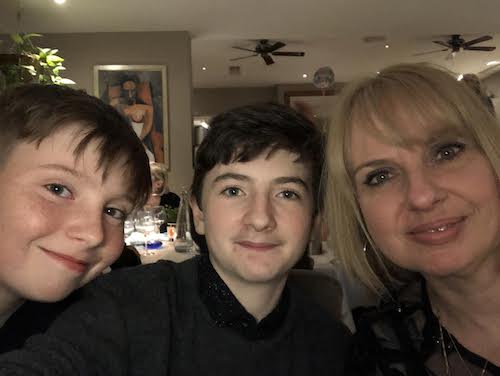
He did ask me why he was not named after a rapper at the dinner table a few years ago. After I stopped laughing, he was then known as ‘half pence’ for a while.
Kirry is cheeky, freckly, funny but moody and moves as fast as a sloth. Morgan (Mo) is the complete opposite and lives his life like the Tasmanian devil and whirls, at pace, into a room and whirls just as fast out of a room. Blink and you will miss him.
Morgan has ADHD and social communication difficulties but has always had a rare, special gift of making someone feel really special. He has always been ‘my legs’ for me. He is a whirlwind of energy. From being young to now, he has constantly been on the move.
My condition completely zaps my energy; the fatigue is one of the most frustrating parts of EDS for me. My head can do so much but then my body says no – it ranges somewhere between pain and fatigue.
There have been times when I have sat on my sofa watching Mo jump up and down whilst talking to me or whizz around the room in the evening and I feel exhausted just watching him.
With the help that I get from him, he has been interviewed by Newsround, Sky TV and been on LBC radio for being a young carer.
I can ask Mo to do something for me and by the time he has left the room, he has already forgotten, but that is Mo and I accept him for who he is.
After Kirry was born, I had an operation about two months later on my knee, so I was in a brace with a two-month-old baby. I couldn’t get up the stairs to bed and my mum could not help me, as it was the time of swine flu, and as she was a carer for my grandad, so unable to get out and about.
It was a tough time, but I had no choice, I had to get on with it. I slept on the sofa bed with the moses basket next to me. I was in bed by 8pm to cope with the night feeds. It hasn’t been the first operation or accident I have had since having children and I am sure that it will not be the last. I am lucky that my mum and dad are there for me though.
Direct payment and benefits
When the children were young, I used to receive direct payments to help. I have always worked (full or part time), so the help that I had in the mornings was to help me by getting the boys ready to get to school.
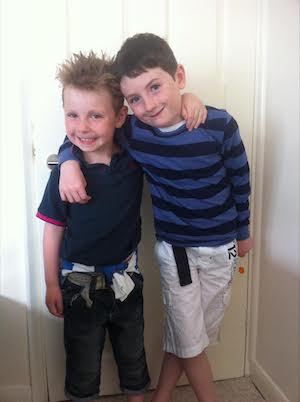
My support would come in and give the boys their breakfast, make their pack lunch, clean and tidy so that I could see to myself and get to work without having used all of my energy before I have even left the house.
The boys would also go to their childminder on certain days so that I could come home from work and sleep before they rushed through the door to tell me about their day, or at least what they remembered of their day.
Direct payments are available through your local authority and are means tested, so you may or may not need to provide a contribution depending on how much money you have.
Originally, direct payments were mainly used for personal care, but now they are used for gaining more independence and can be used in different ways.
If you feel that you need extra help, then you can always contact your local authority for help – whether that is be referred to a social worker (the gate keeper to a lot of services including direct payments or respite for you or the children), support and advice on housing, council tax or benefits.
Likewise, it is also worth looking at Personal Independent Payments (PIP), which can help with some funds, motability car or wheelchair.
Memorable and challenging moments as a disabled parent
For the difficulties that I have experienced, there have been many memorable, funny and caring times – just like any family.
The first time I ‘chased’ my boys was when I hired a scooter when we went out for the day. It felt great to be able to do that and was one of the reasons why I knew it was time to get myself a wheelchair. It had been a long process to get me to that point.

Now I have two tech gurus living under my roof, who quite often tell me that I need to get to bed or not to exert myself to the point of exhaustion and can make a (fairly) decent cup of tea, follow a simple recipe or be my legs for me and walk the dogs.
As with any teenager there is generally a great deal of negotiation to get this done.
I also have three fur babies, three shih tzu dogs called Willow, Pebbles and Dudley, who are not just amazing company but force me to get out of bed in the morning. They are supposed to be ‘low energy’ dogs, which I thought would be ideal when I was doing my research for what dog to get.
However they have not read the manual and hoon around the park and garden playing with their toys and each other. They feel like assistance dogs (to me) and have kept me on a level when I think that my poor mental health may swallow me up and spit me down a dark rabbit hole.

Patience and tolerance
Being a disabled parent has enforced me to have patience and tolerance, even when I get frustrated. It is not always easy and has been a journey.
An example of this was one weekend when I went to the local dump. Kirry had taken my wheelchair out of the car, loaded the boot with debris from the house that I am decorating and I went to the dump.
I asked one of the staff if they could help as I could not physically move and carry the rubbish. In a most unhelpful tone and shrug of the shoulders, he said that he couldn’t help. I had to return home with the boot full and I cried all the way home.
It felt that all of my independence had been left at the dump and I was upset, angry and hating my disability during my drive home.
Morgan came out to the car, jumped in and told me to go back to the dump and he unpacked the car for me. Kirry had bought me a bar of chocolate and I took to the sofa for the rest of the day and scoffed the chocolate whilst feeling sorry for myself.
Those occasions are rare. I had to accept that I was not as independent as I thought I was. A difficult pill to swallow when I have spent the last twenty years of my life promoting and encouraging disabled people to have more independence and work.
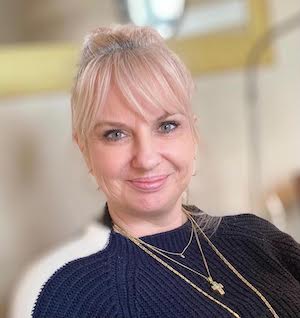
Pacing and when to use my ‘spoons’
Similar to patience is pacing. I would like our home to be ultra-tidy. The boys and dogs have other ideas. I do not want to live with dinner plates and bowls living on the kitchen counter tops (or in the boys bedrooms), cardboard boxes in the garden (from moving), shoes and socks not paired and generally in separate rooms or dog toys strewn in every single room.
I cannot clear all of that up and still function. I can clear some of it and rest. I can then clear up some more or think to myself that it can wait until the morning. A door between the mess and me helps. If I can live within my means, I can kind of manage but when circumstances are out of my control, then I move into the “boom, bust” model of energy use.
For example, I remember after some terrible weather, the rain had come in under my front door and after sweeping the rain out of the house, it resulted in me having a few days in bed.
Another time, a few years ago, when I was more mobile, I gave the dogs a really good walk, felt great and then had to sleep the rest of the day.
I choose how I use my energy. I still need to keep some energy reserved for cooking dinner. I have often looked at what has been cooked for the kids for dinner and feel miserable about what I served. I just can’t walk around the kitchen whilst cooking. You would be surprised by how many steps it is to the fridge, cooker, hob and sink (and that is in a small kitchen).
Someone once told me a saying about “putting on the dishwasher twice”. Sometimes it is just too knackering at the end of the day to do a super job of rinsing the plates before stacking them in the dishwasher. If you put the dishes straight into the dishwasher and some come out dirty, then so be it. Return them to the dishwasher and they can be washed again.
I think that is what I am trying to say is “don’t sweat the small stuff”, if things are not perfect then that is ok.
Buying goods and services
I am fortunate that I earn money from my job and my business, so I use this for a lot of jobs that I cannot do or choose not to do to conserve energy and alleviate pain. I have a lovely cleaner who is an absolute demon in the house. She is amazing. If I did what she does, I would be ruined and in bed for days.
When it comes to the weekend, I ask myself, do I want to use my energy cleaning or seeing friends or hitting the movies with the boys? It is a no-brainer. I have to pay for a lot and it does irritate me (I wonder why the cost of living is more expensive for disabled people than for non-disabled people).
Decorators, chippies, plumbers, electricians, ironing etc whenever I need something doing in the house. It gets frustrating (and expensive).
The more disabled I get, the more I need help. I used to be able to do some painting but I can no longer do it, as my hand hurt too much and I cannot keep moving or standing around.
The boys are going to be painting the summer house for me for my birthday and I would not want to be a fly on the wall whilst they do it.
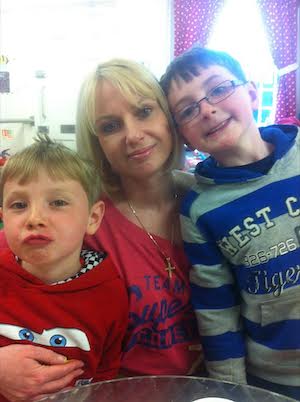
Support from friends and family
I think the reason why I have to buy in help is that I do not want to take advantage of people’s generosity and help. When it comes to my parents, they are great but also nearly 30 years older than me and I am conscious of that.
Now that the boys are older, it is easier, as there is not the whole nappy changing, picking up scenario that there once was. Likewise, I find it’s difficult to ask a friend to look after the kids or help me with things when I know that they are tired too and have their own families to look after.
This is just a whistle stop tour of my parenting thoughts and skills. Parenting is hard work, no matter who you are. It can be even harder as a disabled parent, but it is worth it and I have a very close relationship with my boys and I hope that I always will.
By Emma Shepherd
More on Disability Horizons…